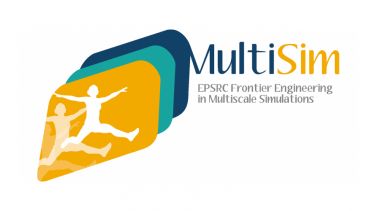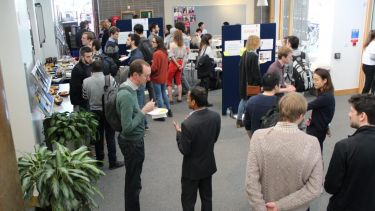Outcomes from MultiSim’s stakeholder workshops
MultiSim workshops were held in 2019 and 2014.
EPSRC MultiSim Interdisciplinary Workshop 2019
This event attracted over 40 participants from Sheffield and universities across the UK, including Oxford, Anglia Ruskin, Nottingham, Manchester, and Leeds.
Dr Pinaki Bhattacharya welcomed the participants to the event and Prof Claudia Mazzà introduced the MultiSim project. The MultiSim project investigates the musculoskeletal system using multiscale models linking whole body movement, through multi-body models, structural models of the bones down to tissue and cell models to understand bone remodelling. She then announced the continuation of MultiSim through a newly awarded EPSRC Frontier Engineering Progression Grant.
Throughout the afternoon, the participants heard from different speakers about the use of multiscale models their different applications:
- Joshua Elliot, University of Manchester, described its use in quantum mechanical and atomistic simulations of graphene membranes and polymer aggregates;
- Pinaki Bhattacharya, University of Sheffield, explained his approach of scale separation related to instrumentation scope and resolution for musculoskeletal biomechanics;
- Stephen Payne, University of Oxford, described his approach to predicting how blood flow through the multiscale cerebrovascular network changes during ischaemic stroke and
- Colin Freeman, University of Sheffield described his multiscale approach to modelling molecules and materials in applications related to micro-scaled devices and magnetoelastic systems.
- Throughout the event, participants could network with each other over lunch and coffee. The participants arranged into mixed groups of disciplines and institutions and exchanged their approaches and the challenges they faced in employing multiscale models in their disciplines. The groups shared the results of these discussions during the closing session.
Dr Pinaki Bhattacharya who arranged and hosted this workshop said “This workshop highlights the tremendous diversity of applications of multiscale modelling. Yet, even across this diversity of themes, several common challenges (e.g. experimental validation) and opportunities (e.g. high-performance computing) emerged. To me, this suggests the need for more such interdisciplinary exchanges. I think most of our participants today will agree.”
MultiSim Stakeholder Workshop 2014
The MultiSim programme, sponsored by EPSRC under its Frontier Engineering Awards, held a two-day workshop to discuss the opportunities and technological challenges associated with modelling the neuromusculoskeletal (MSK) system.
Download the full 2014 Workshop report (PDF, 760KB)
The workshop was attended by 40 participants from the UK MSK community, including leading academics from 15 UK universities, industrial representatives, key individuals from EPSRC, and several clinicians from Sheffield Teaching Hospitals.
MSK research has made significant progress in the last five to ten years, thanks in particular to the development of new computational modelling techniques and the intensified use of clinical imaging data. This has led to the development of multiscale models that include more and more personalisation about the patient. Such models have enabled, for example, much more accurate predictions of the risk of bone fracture in osteoporotic patients and helped surgeons to decide the optimal treatment for lower back pain in a patient-specific manner.
In the future, the use of such personalised medicine and multiscale models will intensify to provide more accurate clinical tools and reduce the costs associated with diagnosis, treatment and monitoring of patients.
With the integration of complex biological and physical processes, more transdisciplinarity between engineers, clinicians and biologists is required. This means that more efforts are needed to provide such interdisciplinary training at all levels and to facilitate clinicians to perform research.
There is a risk of seeing scientific and clinical progress being hindered by the lack of adequate infrastructure that enables testing and validation of our MSK system, and that can handle the integration of large patient data in a seamless manner for the researcher while preserving the anonymity of the patient. It was recognised that the MSK community needs to have a bigger say at the national level, to adequately formulate the importance of MSK disorders within society and highlight the necessity of being included in discussions on the modernisation of the healthcare system.
The outcomes from this workshop are well aligned with the research focus and strategic challenges outlined by several key funding bodies including the recent EPSRC Healthcare Technologies and Engineering Grand Challenges. It was concluded that an MSK network within the UK should be developed as a result of this workshop.

MultiSim Project
Aiming to create a new generation of predictive models capable of handling complex multi-scale and multiphysics problems, characterised by uncertain and incomplete information.



